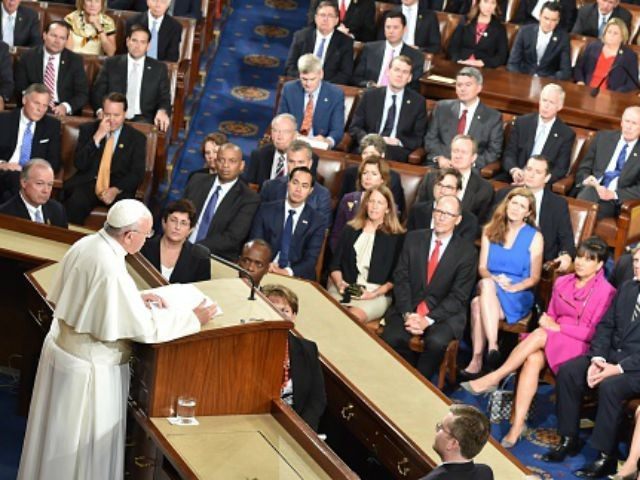In a remarkable role reversal, Pope Francis took advantage of his historic address to the U.S. Congress to lecture politicians on the importance of wealth creation for lifting the poor out of poverty.
Back in July, when a journalist told the Pope that many Americans view his words on the global economy as a criticism of the American economic system and way of life, Francis promised that he would take the critique seriously and would study up on American economic life.
He was also criticized for paying too little attention to the middle class, “people who work and pay their taxes, normal people.”
“That’s a good correction,” the Pope replied. “You’re right. It has been my mistake not to think about this,” after which he acknowledged: “I should go more into this in my teaching.”
Now, in the most important political address of his trip, the Pope has done just that, holding up hard-working members of the middle class as an example to all and praising the U.S. free market system. Stymieing the predictions of the pundits who announced that the Pope would “probably discuss American capitalism’s flaws” in his words to Congress, he has done the opposite.
Likening the men and women of Congress to the biblical figure of Moses, he reminded them of the importance of the simple, industrious people who make America great.
The Pope said that it is “the many thousands of men and women who strive each day to do an honest day’s work, to bring home their daily bread, to save money and – one step at a time – to build a better life for their families” who “sustain the life of society.”
These men and women “generate solidarity by their actions, and they create organizations which offer a helping hand to those most in need,” he said.
But the Pope’s most striking words came when speaking about the ability of the free market to lift people out of poverty.
In the fight against poverty, Francis said, it “goes without saying that part of this great effort is the creation and distribution of wealth. The right use of natural resources, the proper application of technology and the harnessing of the spirit of enterprise are essential elements of an economy which seeks to be modern, inclusive and sustainable.”
“Business is a noble vocation,” the Pope continued, “directed to producing wealth and improving the world. It can be a fruitful source of prosperity for the area in which it operates, especially if it sees the creation of jobs as an essential part of its service to the common good.”
This doesn’t mean that Francis will lessen his attention on helping the poor, but it does signal a realization that the free market system can do just that.
Follow Thomas D. Williams on Twitter @tdwilliamsrome

COMMENTS
Please let us know if you're having issues with commenting.